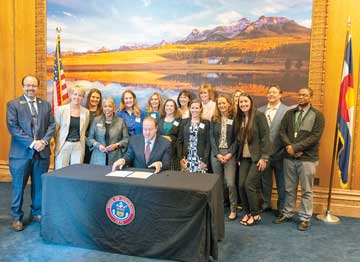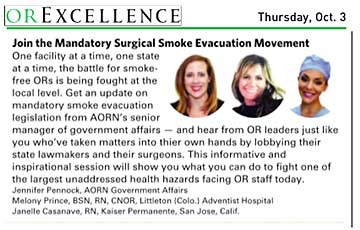Jennifer Pennock is AORN's senior manager of government affairs, though lately a better title for her might be senior manager of smoke evacuation legislation efforts. There's lots of excitement around smoke evacuation legislation, and rightly so, and Ms. Pennock is right in the thick of the advocacy efforts, lobbying state legislators and other policymakers for mandatory smoke-free OR laws and educating them about the dangers of exposure to surgical smoke.
With new laws in Rhode Island and Colorado requiring hospitals and surgery centers to adopt and implement a policy that prevents human exposure to surgical smoke via the use of a smoke evacuation system for all planned procedures likely to generate surgical smoke, and a similar bill pending in Oregon, perioperative nurse advocates across the country are starting conversations with their legislators with an eye toward advancing similar legislation in their own states.
"After we came back from AORN Global Surgical Conference & Expo, everybody was really excited and wanted smoke-free laws passed in their state yesterday," says Ms. Pennock, only half-joking.
AORN spearheaded the Rhode Island and Colorado efforts, and is also leading the initiative in Oregon. The Rhode Island law went into effect on Jan. 1, 2019, and implementation for facilities reportedly has been smooth. Colorado's law is effective in May 2021, leaving hospitals and ambulatory surgery centers ample time to become compliant. Oregon's surgical smoke evacuation bill had its first hearing in May 2019, with a vote on the bill anticipated for Oregon's 2020 legislative session.
On the regulatory side, California's Division of Occupational Safety and Health (Cal/OSHA) convened a meeting on surgical plume in November 2018 and accepted comments on a proposed draft of regulations in January 2019. A second round of proposed regulations and public comment is expected from Cal/OSHA later this year.
A key lesson Ms. Pennock has learned thus far: legislation mustn't be overly prescriptive. Some rural facilities, for example, might object to the added cost of buying smoke evacuation equipment. Some surgeons might not like certain instruments they consider to be bulky or noisy.
"The language we use is, mandating that they have a policy in place for the evacuation of surgical smoke in hospitals and ASCs. We give hospitals and surgery centers the flexibility to choose the equipment that works for them in the manner that works for them," says Ms. Pennock.
.svg?sfvrsn=be606e78_3)


.svg?sfvrsn=56b2f850_5)